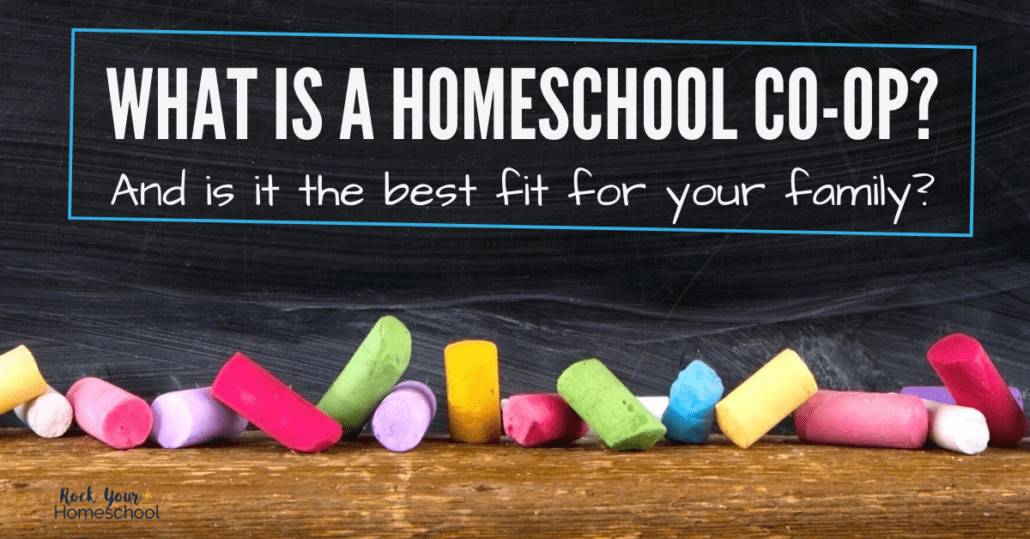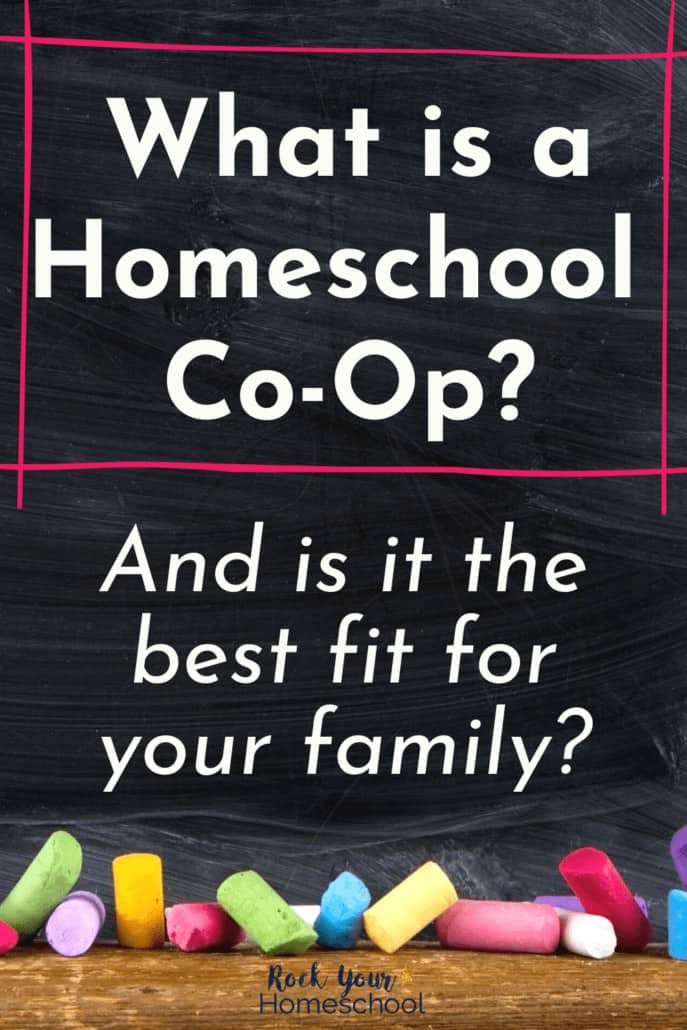What is a Homeschool Co-Op & Is It The Best Fit for My Family?
This post may contain affiliate links. Please read my disclosure statement. Thanks for visiting!
Are you thinking about a homeschool co-op but not sure if it's the best fit for your family?
Learn more about homeschool co-ops and why these options can help boost your learn at home adventures.

My 5 boys and I do not belong to a homeschool co-op. In our area, the closest one is over an hour a way. Doable but tough with our erratic homeschool schedule.
To help us better understand what homeschool co-ops are and how to determine if joining one is right for your family, I've invited Courtney Day from A Girl in Yellow to share her experiences and recommendations.
What Is a Homeschool Co-Op?
My children and I have fond memories of our days spent at a homeschool co-op.
We developed lasting friendships and ate meals together. Families worked on fundraising projects and engaged in fun activities. And, of course, we learned alongside one another.
Sounds great, right? Why wouldn’t every homeschooler be involved in this magical place called homeschool co-op?
To answer that question, we must first dive into the definition of a homeschool co-op.
Co-ops for homeschoolers are a group of families who meet together, working cooperatively towards a common goal.
The reasons for meeting can vary. Most homeschool co-ops that I’ve encountered offer academic classes. I've heard of other co-ops meeting for social purposes, field trips, service projects, etc.
There are both religious and secular co-ops.
Some homeschool co-ops are tailored to a specific learning style, like Charlotte Mason, Classical, or Eclectic.
Others are tailored to High School or Middle School and many offer courses for every age group.
Parents are often involved in teaching and planning the classes offered. They're expected to be involved in some capacity, possibly in the nursery or as a member of the clean-up crew, if they prefer not to teach.
Often, a homeschool co-op will only meet once or twice a week. Many homeschool co-ops rent space from a church or community center rather than lease or purchase an entire building.
Phew! That’s a lot of information for a definition of homeschool co-op 😉
Hopefully, you have the understanding that co-ops can widely vary. This type of variety is great for homeschoolers because it makes it more likely that we should be able to discover one that fits our unique needs.
I've found that social media is the simplest way to find a co-op. Search for local homeschooling groups and ask for co-op information.

Our Experience with a Co-Op
To help you get a better taste of what a homeschool co-op can be like, here's a glimpse at our experiences.
My family attended a homeschool co-op for a few years when my children were in 6th grade and under.
Our co-op met in a church on Fridays, for 8 weeks during each of the Fall and Spring Semesters. Classes were available for Pre-K through High School.
Before the beginning of each semester, we would register our children for their chosen classes. This registration process gave a headcount of the student so the teachers could be better prepared.
Parents selected the classes they desired to teach with at least two options per grade in each time slot.
In order to keep costs low, we'd hold a fundraiser each semester. A leadership team took care of the business side of things and to ensure that it was run smoothly. Our Fridays at co-op were a bright spot in our week. We all looked forward to it!
The homeschool co-op classes were engaging and complimented the work we were doing at home.
Most of the younger grades were elective courses while the older children often took meatier classes like Logic or Science.
A few favorite classes were Dinosaurs, Art History, Reptiles, Transportation, The History of Thanksgiving, Rocks, Karate, Choir, and Drama. You can see that the class possibilities are endless!
Teachers could utilize a number of resources to teach their classes and my children often came home with work they were proud to show off.
We ended each semester with Dinner and Display. This allowed our children to perform on stage or showcase their work to friends and family. We were grateful for the opportunity to share with grandparents and friends all the work we had accomplished.
We really had fun and enjoyed our time at our homeschool co-op. You might be wondering why we left and I’m happy to explain.
The simple answer is it was no longer a good fit for our family.
About a year before we left co-op, I made changes to our curriculum that we were using at home. Co-op had always been full of fun electives and our core work was separate.
The new curriculum made it difficult to dedicate a full day, several times a year, to outside classes. As my children were aging up, they needed more time to study and work at home.
We also had some changes take place in our family life. I became more involved in the care of my grandparents and this responsibility created some scheduling challenges.

How Do You Know If a Homeschool Co-op Is a Good Fit for Your Family?
In my experience, most homeschool co-ops fall into one of two categories: social opportunities with fun learning or core subjects (like languages, math, science, and literature).
If you're thinking about joining a homeschool co-op, what do you expect to gain from it?
If you're looking for accountability and teaching help, you most likely want core subjects taught. Or perhaps you can manage all your cores at home and are looking to create new friendships for both you and your children?
Once you determine your answer, it will be much easier to weed through your co-op options.
There are a few other things to consider as well, like:
- What are the homeschooling laws in your state pertaining to co-ops?
- Does the co-op align with your beliefs?
- Do you have flexibility in your curriculum choices?
- Do you have space in your calendar to attend, plan, socialize, etc?
- Will your homeschool budget allow you to join a co-op?
- Are there drop off options or is a parent required to stay and be involved?
- Who is teaching the classes?
- Does it make sense geographically? (I realize that seems like an odd question. However, I live in a rural area and travel time is something I need to consider.)

Now you’ve considered all the questions, it's time to make a decision if you'll join a homeschool co-op. So exciting!
But, what if you've poured over your available options and discovered that none of the existing homeschool co-ops meet your needs? Then, my friend, you can start your own! (I'll be sharing my tips and ideas for starting a homeschool co-op in your home here on Rock Your Homeschool soon!)
After learning more about homeschool co-ops and if these options are the right fit for your family, do you have any questions that I can help answer? Please leave your questions (or experiences) in the comments area below 🙂

thank you